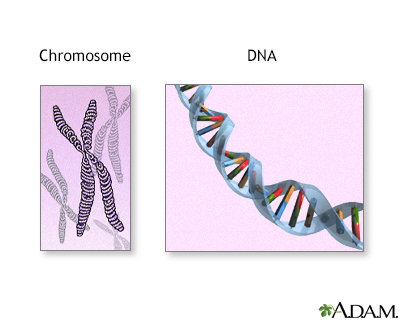Pregnancy SmartSiteTM
DefinitionTranslocation means a change in location. It often refers to genetics, when part of a chromosome is transferred to another chromosome. Chromosomes are structures that carry genes, our units of heredity. When a translocation occurs, it can cause flaws in chromosomes. In another type of translocation, two chromosomes trade pieces with each other. Genetic translocations can cause serious disorders, including a type of leukemia. ReferencesKumar V, Abbas AK, Aster JC. Neoplasia. In: Kumar V, Abbas AK, Aster JC, eds. Robbins & Cotran Pathologic Basis of Disease. 10th ed. Philadelphia, PA: Elsevier; 2021:chap 7. | |
| |
Review Date: 11/1/2023 Reviewed By: Linda J. Vorvick, MD, Clinical Professor, Department of Family Medicine, UW Medicine, School of Medicine, University of Washington, Seattle, WA. Also reviewed by David C. Dugdale, MD, Medical Director, Brenda Conaway, Editorial Director, and the A.D.A.M. Editorial team. The information provided herein should not be used during any medical emergency or for the diagnosis or treatment of any medical condition. A licensed medical professional should be consulted for diagnosis and treatment of any and all medical conditions. Links to other sites are provided for information only -- they do not constitute endorsements of those other sites. No warranty of any kind, either expressed or implied, is made as to the accuracy, reliability, timeliness, or correctness of any translations made by a third-party service of the information provided herein into any other language. © 1997- A.D.A.M., a business unit of Ebix, Inc. Any duplication or distribution of the information contained herein is strictly prohibited. | |

 Chromosomes and DN
Chromosomes and DN
